2024 to 2025 Annual Report on the Access to Information Act
On this page
- Introduction
- Purpose of the Access to Information Act
- Mandate of the Treasury Board of Canada Secretariat
- Delegation order for the Access to Information Act
- Organization structure
- Interpretation of the statistical report for the Access to Information Act
- Part 2 of the Access to Information Act
- Initiatives and projects to improve access to information
- Education, training and awareness
- Policies, guidelines and procedures
- Monitoring compliance
- Conclusion
- Appendix A. Delegation Order – Access to Information Act
- Appendix B. Proactive publication requirements
Introduction
The Treasury Board of Canada Secretariat (TBS) is pleased to present to Parliament its annual report on the administration of the Access to Information Act (ATIA) for 2024–25 (April 1, 2024, to March 31, 2025).
This report is prepared and tabled in accordance with section 94 of the ATIA, which requires that the head of every federal institution prepare and submit an annual report to Parliament on the administration of the ATIA in the institution during the fiscal year.
Purpose of the Access to Information Act
The purpose of the ATIA is to enhance the accountability and transparency of federal institutions, to promote an open and democratic society and to enable public debate on the conduct of those institutions. To further that purpose:
- Part 1 extends the present laws of Canada to provide a right of access to information in records under the control of a government institution in accordance with the principles that government information should be available to the public, that necessary exceptions to the right of access should be limited and specific, and that decisions about the disclosure of government information should be reviewed independently of government
- Part 2 sets out requirements for the proactive publication of information
Mandate of the Treasury Board of Canada Secretariat
As the administrative arm of the Treasury Board, TBS has a dual mandate: to support the Treasury Board as a committee of ministers and to fulfill the statutory responsibilities of a central government agency and those of a line department.
The Treasury Board’s mandate is derived from the Financial Administration Act.
To fulfill its mandate, TBS organizes its business and resources around four core responsibilities:
- spending oversight
- administrative leadership
- employer
- regulatory oversight
TBS provides advice and support to Treasury Board ministers in their role of ensuring value for money. TBS also provides oversight of the financial management functions in federal institutions.
TBS makes recommendations and provides advice to the Treasury Board on policies, directives, regulations and program expenditure proposals with respect to the management of the government’s resources. TBS is responsible for the general management of government-wide initiatives, issues and activities (as reported in the Main Estimates).
The offices of the following government officials are part of TBS:
- the Comptroller General of Canada
- the Chief Human Resources Officer of Canada
- the Chief Information Officer of Canada
The Comptroller General is responsible for the comptrollership function of government and provides government-wide leadership, direction, oversight and capacity-building for financial management, internal audit, and the management of assets and acquired services.
The Chief Human Resources Officer provides government-wide leadership on people management through policies, programs and strategic engagement by centrally managing labour relations, compensation, pensions and benefits, and by contributing to the management of executives.
The Chief Information Officer provides government-wide leadership, direction, oversight and capacity-building for information management, information technology, government security (including identity management), access to information, privacy, and internal and external service delivery.
Delegation order for the Access to Information Act
Pursuant to subsection 95(1) of the ATIA, the President of the Treasury Board has delegated the powers, duties and functions for the administration of the ATIA to the following TBS officials:
- the Secretary of the Treasury Board
- the Assistant Secretary of Strategic Communications and Ministerial Affairs
- the Senior Director of Ministerial Services
- the Director of Access to Information and Privacy (ATIP)
- managers and team leaders of the ATIP office
The delegation order was signed on November 29, 2023, and a copy can be found in Appendix A.
Organization structure
The ATIP office is part of the Ministerial Services Directorate of TBS’s Strategic Communications and Ministerial Affairs sector.
The ATIP office is responsible for:
- implementing and managing programs and services related to TBS’s administration of the ATIA and the Privacy Act (PA) (the acts)
- providing advice to TBS employees as they fulfill their obligations under the acts
- reviewing and releasing records under Part 2 of the ATIA, specifically, briefing note titles, question period notes and transition binders
Outside of the administration of the acts, the ATIP office provides support in the following areas:
- internal reviews of documents intended for publication by sectors
- reviews of documents subject to parliamentary production motions
- reviews of documents related to class action lawsuits
- training sessions on the administration of the actsfor sectors and sector officials
- policy updates and research related to the administration of the acts
- research and reporting on trends within the ATIP office
- systems administration of ATIP software
- various reports
- privacy breach management
- access to information and privacy advice to program sectors
The ATIP office is led by a director who is supported by three managers. Each of these managers oversees a unit that is responsible for a different functional area. The three key units include:
- ATIP Intake, Governance, and Special Projects Unit
- ATIP Operations Unit
- Privacy Policy Unit
The ATIP Intake, Governance, and Special Projects Unit and the ATIP Operations Unit work together to process ATIP requests, whereas the Privacy Policy Unit supports sector officials on privacy-related matters, including the review of privacy impact assessments and privacy breach management.
The ATIP office comprises employees at various levels. There was an equivalent of 15.05 full-time employees who administered the ATIA in 2024–25, consisting of 14.84 full-time employees and 0.21 casual employee. There was an additional equivalent of 8.44 full-time employees who administered the PA in 2024–25, consisting of 7.59 full-time employees and 0.85 part-time employee. Certain employees in the ATIP office contribute to both the ATIA and the PA, and these activities are recorded in the appropriate report proportional with their contributions.
Figure 1 shows the roles of the individuals and teams involved in processing ATIP requests at TBS. The ATIP office has three functional units. Sector liaison officers are not part of the ATIP office but play an important role in processing requests because they coordinate ATIP activities in their respective sectors.
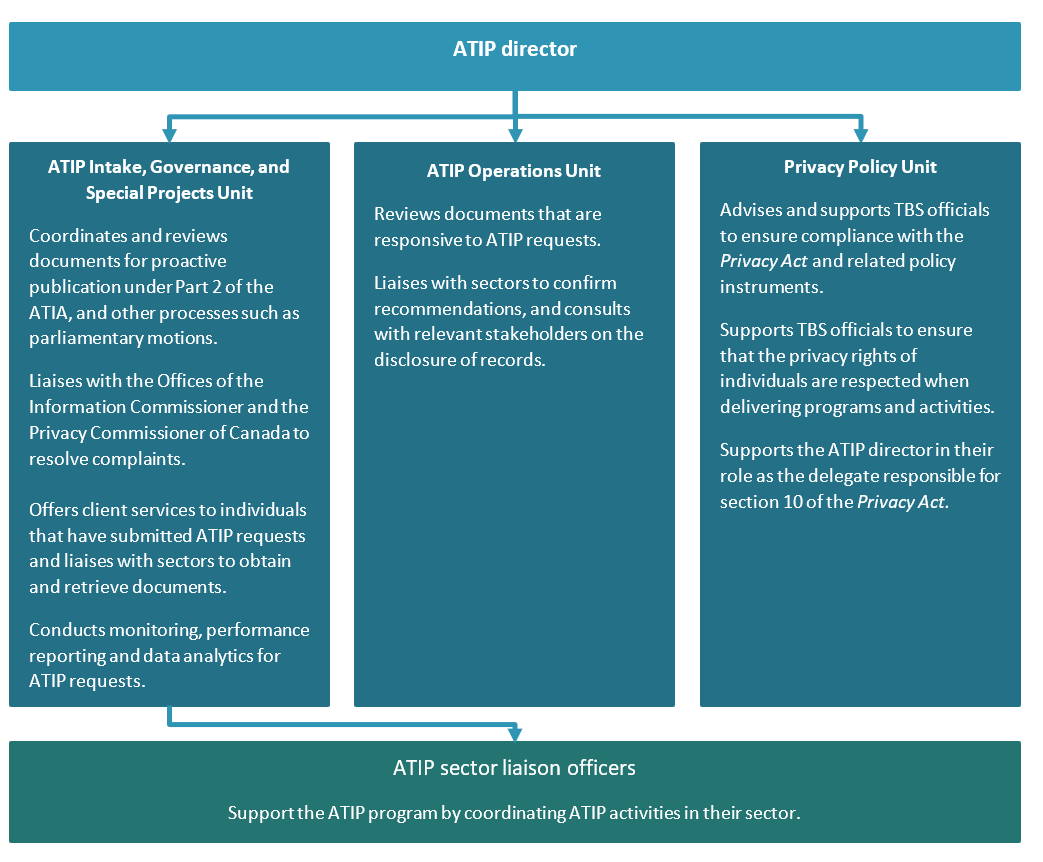
Figure 1 - Text version
ATIP director
ATIP Intake, Governance, and Special Projects Unit:
Coordinates and reviews documents for proactive publication under Part 2 of theATIA, and other processes such as parliamentary motions.
Liaises with the Offices of the Information Commissioner and the Privacy Commissioner of Canada to resolve complaints.
Offers client services to individuals that have submitted ATIP requests and liaises with sectors to obtain and retrieve documents.
Conducts monitoring, performance reporting and data analytics for ATIP requests.
ATIP Operations Unit:
Reviews documents that are responsive to ATIP requests.
Liaises with sectors to confirm recommendations, and consults with relevant stakeholders on the disclosure of records.
Privacy Policy Unit:
Advises and supports TBS officials to ensure compliance with the Privacy Act and related policy instruments.
Supports TBS officials to ensure that the privacy rights of individuals are respected when delivering programs and activities.
Supports the ATIP director in their role as the delegate responsible for section 10 of the Privacy Act.
ATIP sector liaison officers:
Support the ATIP program by coordinating ATIP activities in their sector.
The TBS ATIP office works with the 19 sectors across TBS that retrieve responsive records to ATIP requests. Each sector has assigned sector liaison officers who work directly with the ATIP office to efficiently process requests. The ATIP office also works in partnership with sectors across TBS to complete proactive publication requirements under Part 2 of the ATIA.
The Directive on Proactive Publication under the ATIA requires that all positions in an institution with responsibilities under Part 2 of the ATIA be clearly identified. At TBS, responsibilities under Part 2 of the ATIA are assigned to officials based on the nature of the proactive publication requirement. Proactive publication responsibilities are assigned to officials in several sectors, including the Corporate Services Sector (CSS), Human Resources Directorate (HRD), and Strategic Communications and Ministerial Affairs (SCMA).
For a breakdown of the groups responsible for meeting each applicable proactive publication requirement under Part 2 of the Access to Information Act, see Appendix B: Proactive publication requirements.
Section 96 of the ATIA allows government institutions to provide access to information services to another government institution that is presided over by the same minister. In 2024–25, the ATIP office did not provide any such services.
Interpretation of the statistical report for the Access to Information Act
-
In this section
- Introduction
- Part 1: requests received and carried forward
- Part 2: requests completed
- Part 3: on-time compliance rate, completion times and extensions
- Part 4: informal requests
- Part 5: consultations from other government institutions and organizations
- Part 6: consultations on cabinet confidences
- Part 7: complaints and investigations
- Part 8: court actions
- Part 9: fees
- Part 10: resources related to the Access to Information Act
Introduction
Statistical reports prepared by government institutions provide aggregate data on the application of the ATIA and the PA. This section outlines key metrics in the statistical reports on the administration of the ATIA in TBS.
Part 1: requests received and carried forward
Access to Information Act requests received
In 2024–25, TBS received 469 requests under the ATIA, which is an increase of 28% compared to the 365 requests received in 2023–24.
Access to Information Act requests carried forward
The number of requests that the TBS ATIP office carried forward from previous fiscal years was 194, which is an increase of 28% compared to the 151 requests carried forward in 2023–24.
Figure 2 shows the number of new access to information requests TBS received each year and the number of requests carried forward from 2020–21 to 2024–25.
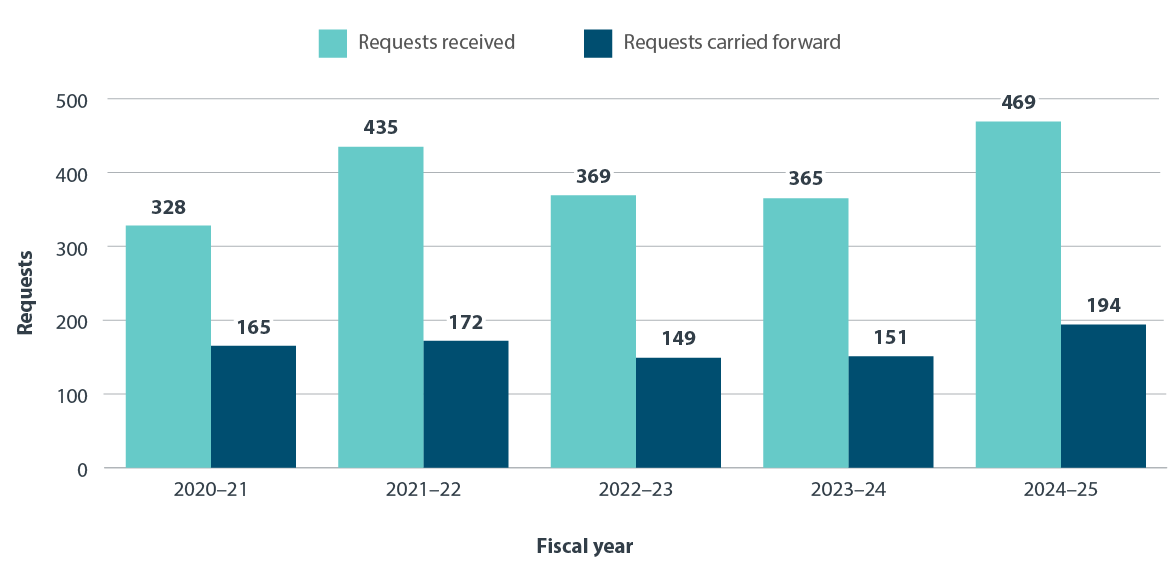
Figure 2 - Text version
| Year | 2020-21 | 2021-22 | 2022-23 | 2023-24 | 2024-25 |
|---|---|---|---|---|---|
| Received | 328 | 435 | 369 | 365 | 469 |
| Carried forward | 165 | 172 | 149 | 151 | 194 |
Sources of requests
Of the 469 requests received in 2024–25, the most significant portion of requesters self-identified as members of the public (212). The second largest category of self-identification was requesters who declined to identify (109). The remaining requests were submitted by requesters who self-identified as media (85), academia (37), organizations (19), and businesses (7).
Figure 3 shows the percentage of access to information requests received by source.
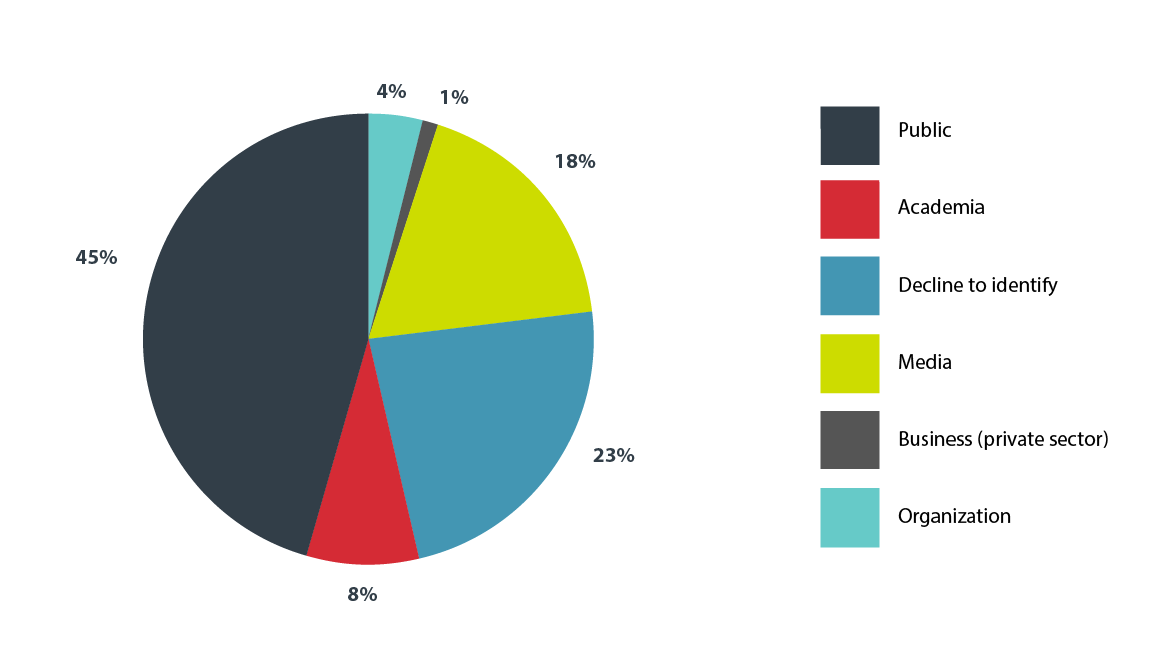
Figure 3 - Text version
| Public | 45% | 212 |
|---|---|---|
| Academia | 8% | 37 |
| Decline to identify | 23% | 109 |
| Media | 18% | 85 |
| Business (private sector) | 1% | 7 |
| Organization | 4% | 19 |
| Total | 100% | 469 |
Part 2: requests completed
Access to information requests completed
In 2024–25, TBS completed 426 requests, which is 63 more completed requests compared to the 363 requests completed in 2023–24.
Figure 4 shows the number of access to information requests TBS completed each year from 2020–21 to 2024–25.
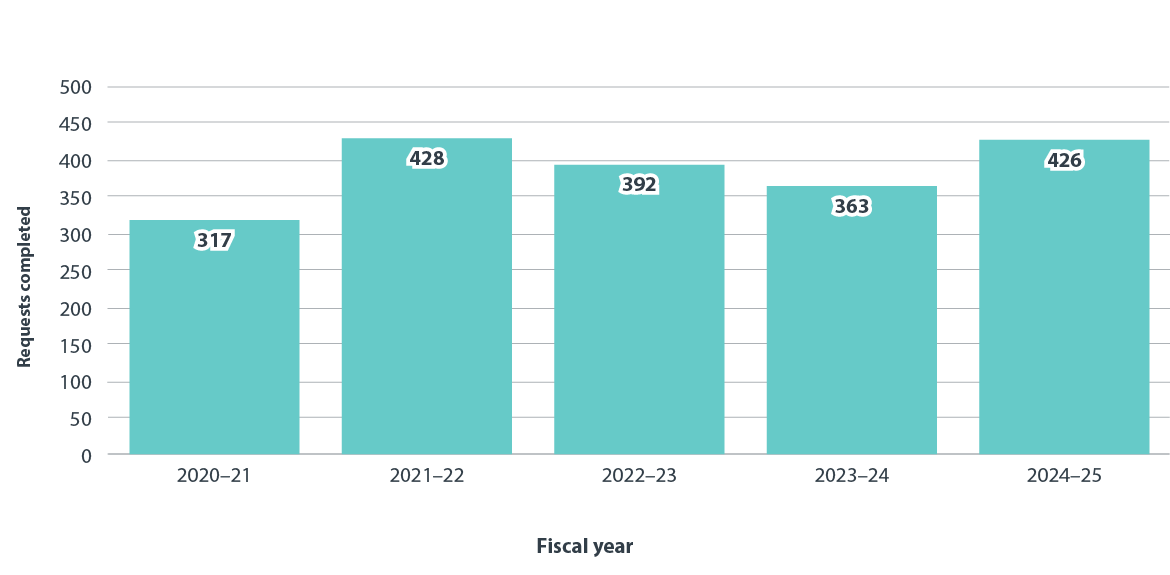
Figure 4 - Text version
| Year | 2020–21 | 2021–22 | 2022–23 | 2023-24 | 2024-25 |
|---|---|---|---|---|---|
| Completed | 317 | 428 | 392 | 363 | 426 |
Disposition of requests completed
The following is a breakdown by disposition of the 426 requests completed in 2024–25:
- 149 requests contained records that were disclosed in partFootnote 1
- 81 requests were abandoned by the requester
- 84 requests contained records that were all disclosed
- 98 requests had no records
- 2 requests were transferred
- 5 requests contained records that were fully exempted
- 6 requests contained records that were fully excluded
- 1 request where TBS did not confirm nor deny the existence of recordsFootnote 2
Figure 5 shows the percentage of access to information requests by disposition for 2024–25.
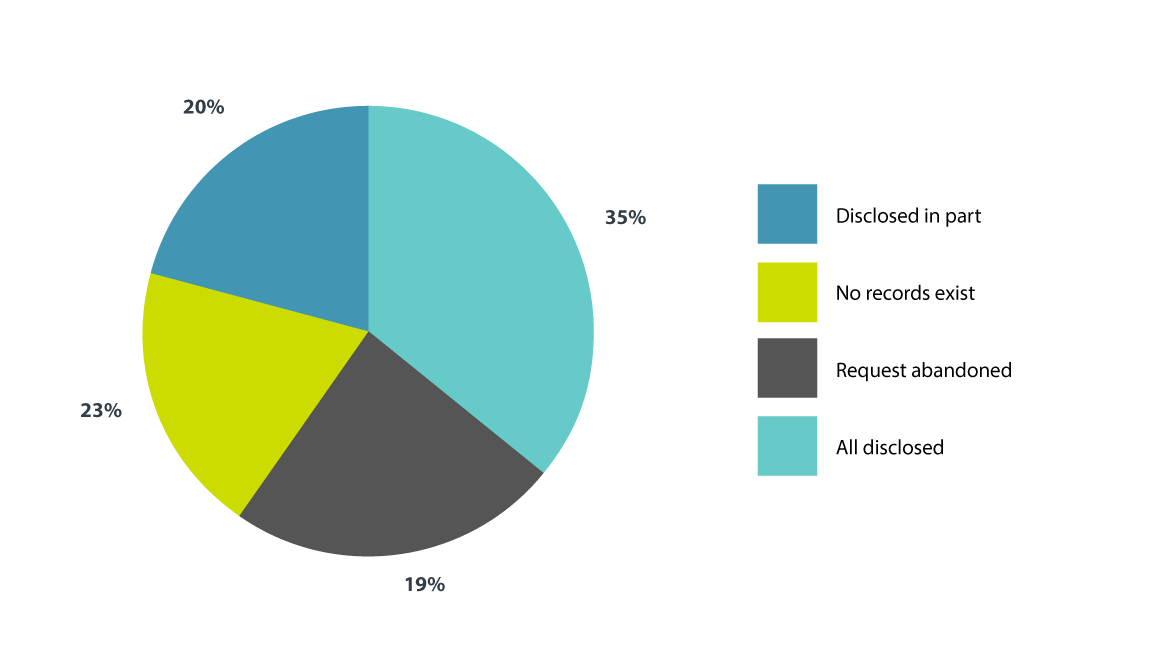
Figure 5 - Text version
| Disposition of requests | Total | % |
|---|---|---|
| Disclosed in part | 149 | 35% |
| No records exist | 98 | 23% |
| Request abandoned | 81 | 19% |
| All disclosed | 84 | 20% |
| All excluded | 6 | 1% |
| Request transferred | 2 | 0% |
| All exempted | 5 | 1% |
| Neither confirmed nor denied | 1 | 0% |
| Declined to act with the approval of the Information Commissioner | 0 | 0% |
| Total | 426 | 100% |
Exemptions
The ATIA exempts certain information from being disclosed. In 2024–25, 154 requests contained information that was subject to the following exemptions.
- information related to the internal decision-making processes of government (119 requests) (section 21 of the ATIA)
- personal information (77 requests) (section 19 of the ATIA)
- law enforcement and security information (45 requests) (section 16 of the ATIA)
- solicitor–client privileged information (39 requests) (section 23 of the ATIA)
- international affairs and defence (39 requests) (section 15 of the ATIA)
- third party information (26 requests) (section 20 of the ATIA)
- safety of individuals (8 requests) (section 17 of the ATIA)
- economic interests of Canada (3 requests) (section 18 of the ATIA)
- refusal of access if information to be published (3 requests) (section 26 of the ATIA)
- federal–provincial affairs (2 requests) (section 14 of the ATIA)
- statutory prohibitions against disclosure (1 request) (section 24 of the ATIA)
- information obtained in confidence (1 request) (section 13 of the ATIA)
Exclusions
Many TBS documents are categorized as cabinet confidences. TBS provides administrative support to the Treasury Board Cabinet committee and provides a central agency challenge function for cabinet submissions of other government institutions. These documents are excluded from disclosure under the ATIA. Records that are publicly available (for example, government publications and records in libraries or museums) are also excluded from disclosure under the ATIA.
In 2024–25, a total of 123 requests contained information that was subject to exclusions:
- confidences of the King’s Privy Council (110 requests) (section 69 of the ATIA)
- published material (13 requests) (subsection 68(a) of the ATIA)
Pages processed and disclosed
TBS completed 426 requests in 2024–25, which involved processing 84,245 pages. This represents a decrease of 16% relative to the 100,014 pages processed in 2023–24.
In 2023–24, a number of voluminous requests were processed on the Direction on Prescribed Presence in the Workplace and the Policy on COVID-19 Vaccination for the Core Public Administration Including the Royal Canadian Mounted Police. The decrease of pages processed in 2024–25 correlates with the decrease in voluminous requests on these policies. Taking 2023–24 out of the analysis, the ATIP office continues to trend upward between 2020–21 to 2024–25 in the number of pages that it is able to review.
Figure 6 shows, for 2020–21 to 2024–25, the number of access to information requests TBS completed and the number of pages processed.
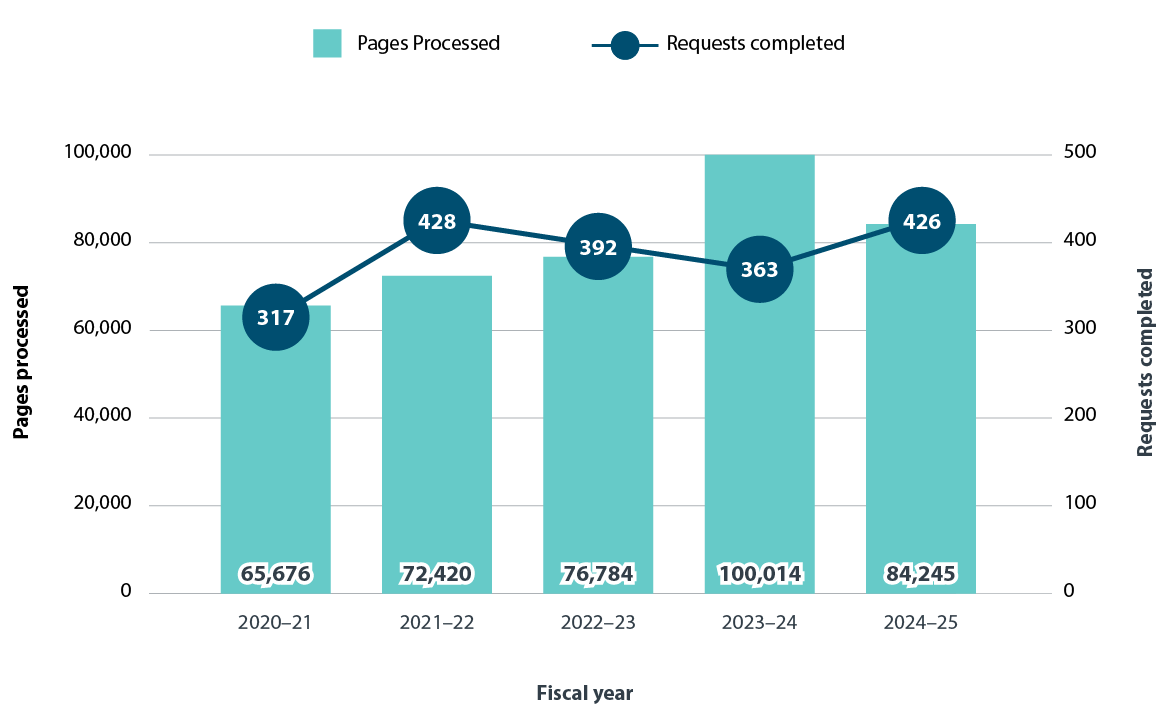
Figure 6 - Text version
| Year | 2020–21 | 2021–22 | 2022–23 | 2023-24 | 2024-25 |
|---|---|---|---|---|---|
| Pages Processed | 65,676 | 72,420 | 76,784 | 100,014 | 84,245 |
| Requests completed | 317 | 428 | 392 | 363 | 426 |
Complexity
As a central agency involved in implementing government-wide policies, TBS holds records that frequently require consultation with other federal institutions before disclosure because these records contain information originating from or of interest to those institutions. Of the 233 requests that were fully or partially disclosed, 33 (or 14%) required formal consultation with other institutions.
In addition to the formal consultation process, an additional 33 requests required informal notifications to government departments. The informal notification process is one mechanism implemented by TBS ATIP to help limit inter-institutional consultations, as advocated by the Office of the Information Commissioner and the Directive on Access to Information Requests. The informal notification process reduces the administrative burden of consultations on other federal institutions and ensures that TBS provides Canadians with expeditious access to government records.
Format of information released
In 2024–25, TBS released information exclusively in electronic formats for all 233 requests for which records were disclosed.
Requests for translation
Subsection 12(2) of the ATIA allows requesters to request that a record be provided in a particular official language. Should the record not exist in that official language, the government institution must translate the record if it is deemed to be in the public interest.
TBS received one request in 2024–25 that required translation of responsive records.
Part 3: on-time compliance rate, completion times and extensions
On-time compliance rate
The on-time compliance rate is the percentage of requests responded to within their legislative timelines, including requests for which the institution invoked legislative extensions.
In 2024–25, TBS achieved an on-time compliance rate of 78.6%. This represents an increase of 7.3 percentage points compared the on-time compliance rate of 71.3% recorded in 2023–24.
Deemed refusals
Government institutions are required to provide access to records within legislative timelines. When an institution fails to provide access to a record within the time limits, the institution is deemed to have refused to give access.
In 2024–25, a total of 91 requests were closed past the legislated timeline for the following reasons:
- interference with operations and workload (56 requests)
- other – difficulty obtaining records (29 requests)
- internal consultation (4 requests)
- external consultation (2 requests)
Time required to complete requests
Of the 426 requests closed in 2024–25, 61% were closed within 30 days, which is an increase of 12 percentage points from 49% recorded in 2023–24. The number of requests that took more than 120 days decreased by 37% from 86 in 2023–24 to 54 in 2024–25.
Figure 7 shows the amount of time that it took to complete access to information requests in 2024–25.
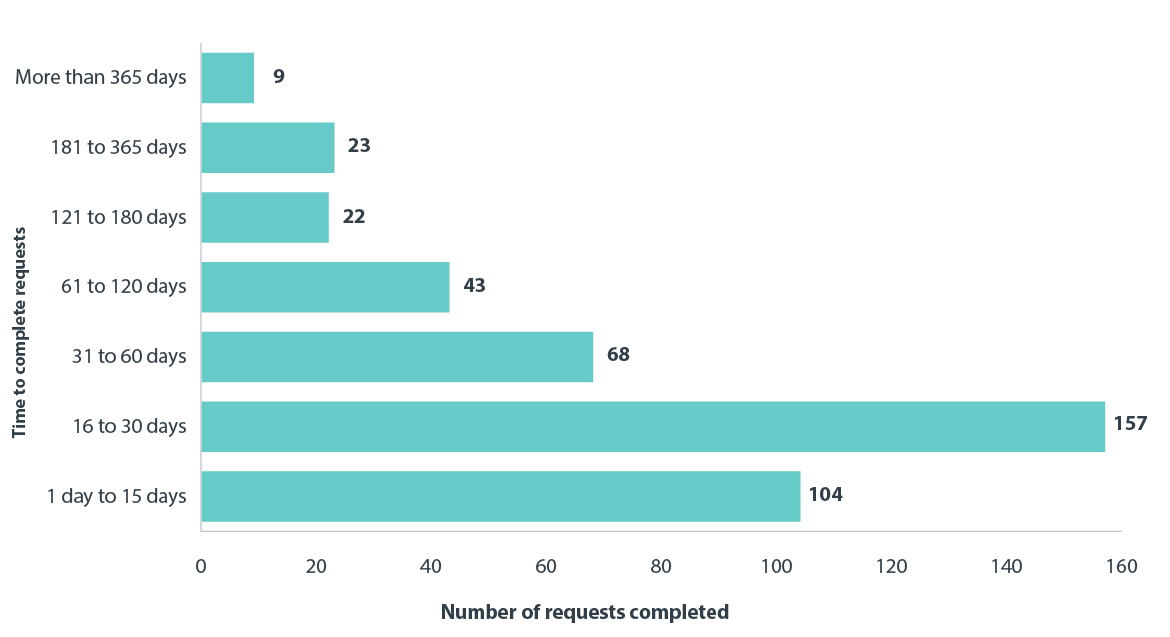
Figure 7 - Text version
| Completion time | 1 day to 15 days | 16 to 30 days | 31 to 60 days | 61 to 120 days | 121 to 180 days | 181 to 365 days | More than 365 days |
|---|---|---|---|---|---|---|---|
| Requests Completed | 104 | 157 | 68 | 43 | 22 | 23 | 9 |
Reasons for extensions
The legislation sets timelines for responding to access to information requests and allows for extensions in any of the following cases:
- when complying with the timeline would interfere with the operations of the government institution due to the volume of pages identified that require review
- when a consultation with other institutions is required
- when a third-party notification is required
In 2024–25, TBS invoked extensions for 88 completed requests, or 21% of all requests completed.
Figure 8 shows the extensions invoked for access to information requests completed in 2024–25.
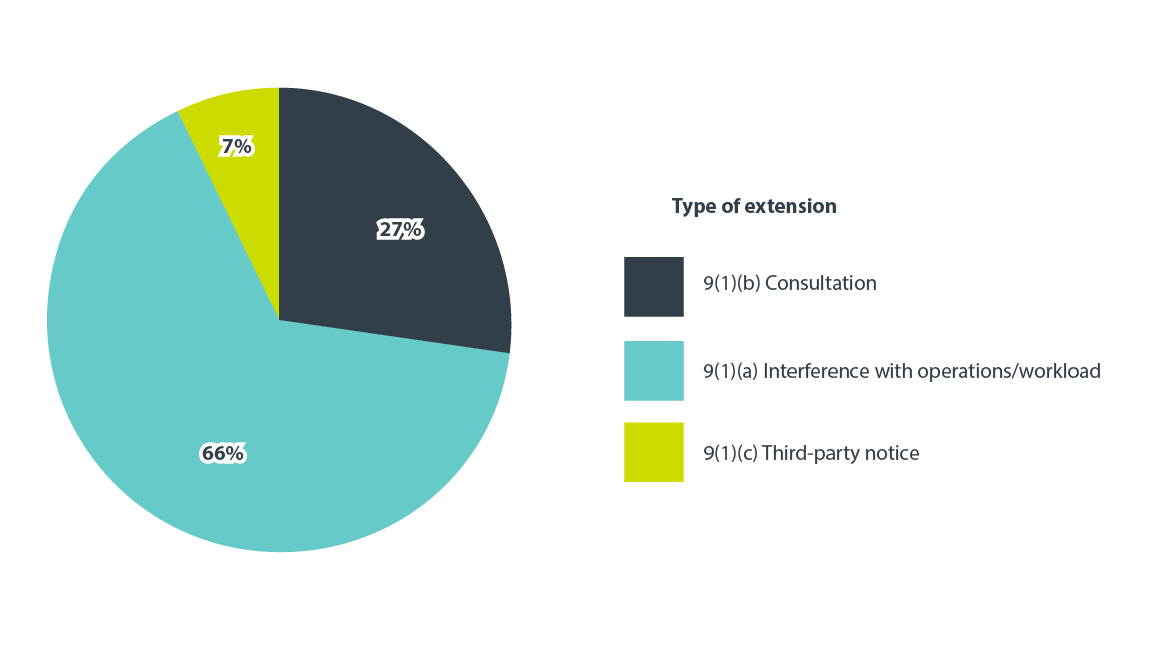
Figure 8 - Text version
| Type of extension | 9(1)(b) consultation |
9(1)(a) interference with operations/workload |
9(1)(c) third-party notice |
|---|---|---|---|
| Number of extensions invoked | 29 | 72 | 8 |
Note: Each request can qualify for multiple extension types, which may result in a greater number of extensions invoked than the number of requests that were extended.
Length of extensions
In 2024–25, TBS completed 88 requests for which extensions had been invoked.
Figure 9 illustrates the length and different types of extensions invoked for access to information requests completed in 2024–25.
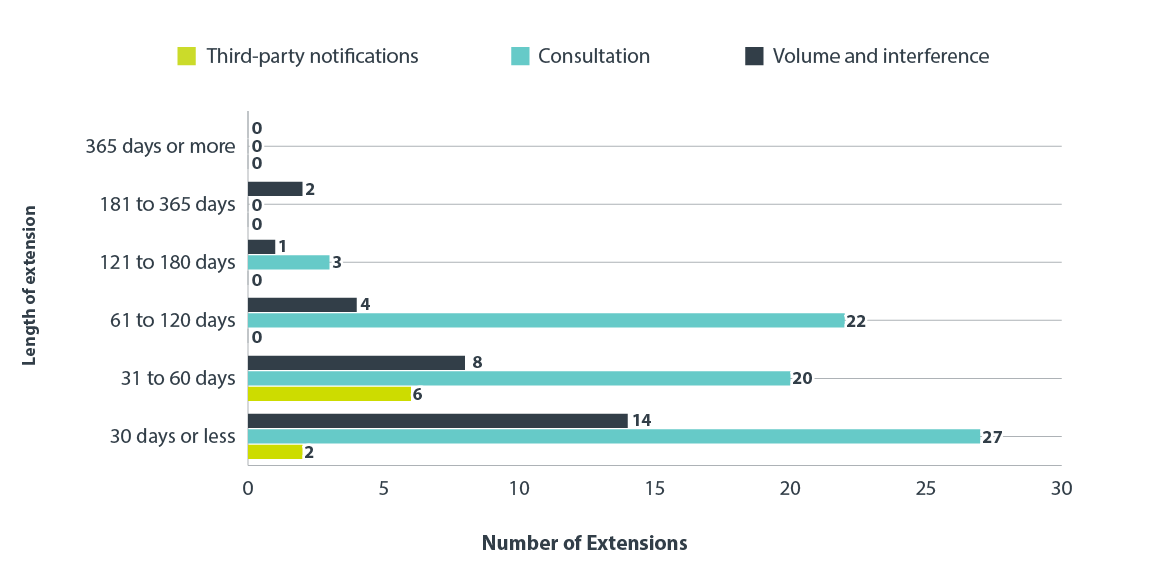
Figure 9 - Text version
| Length of extensions | Volume and interference | Consultation | Third-party notification |
|---|---|---|---|
| 30 days or less | 14 | 27 | 2 |
| 31 to 60 days | 8 | 20 | 6 |
| 61 to 120 days | 4 | 22 | 0 |
| 121 to 180 days | 1 | 3 | 0 |
| 181 to 365 days | 2 | 0 | 0 |
| 365 days or more | 0 | 0 | 0 |
Part 4: informal requests
In order to submit a formal request under the ATIA, requesters must pay a $5 application fee. The institution receiving the request is required by law to provide a response within 30 calendar days of receipt, and requesters have a right to file a complaint with the Office of the Information Commissioner if they are unsatisfied with how their request was processed.
As part of providing Canadians with relevant information on an informal and timely basis, and in the spirit of transparency and open government, TBS processes informal requests for information. Informal requests at TBS are predominantly re-releases of completed formal requests. Unlike formal requests, informal requests:
- are not covered under the ATIA
- do not require an application fee
- do not have legislative deadlines
- do not provide requesters with a right to file a complaint with the Office of the Information Commissioner
Informal requests received
In 2024–25, TBS received a total of 745 informal requests.
Figure 10 shows the number of informal requests received from 2021–22 to 2024–25.
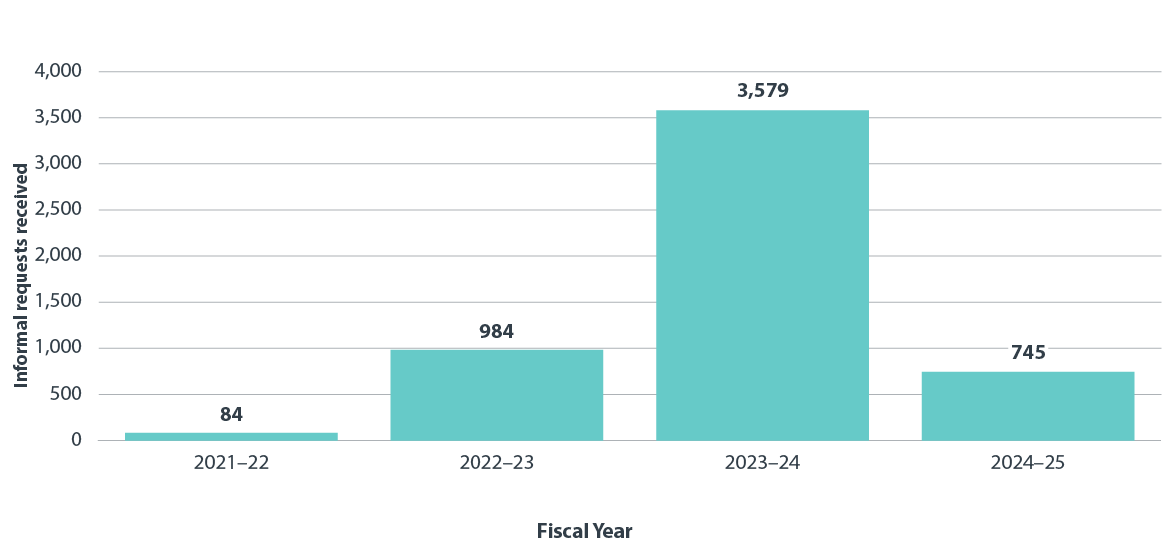
Figure 10 - Text version
| Year | 2021–22 | 2022–23 | 2023–24 | 2024-25 |
|---|---|---|---|---|
| Completed | 84 | 984 | 3,579 | 745 |
Informal requests completed
While informal requests are not subject to the same legislated time frames as formal requests made under the ATIA, TBS strives to complete informal requests within 30 calendar days. In 2024–25, TBS completed 142 of 1,236 informal requests within 30 days.
The 1,236 informal requests completed in 2024–25 represents an increase of 442% relative to the 228 requests completed in 2023–24.
Figure 11 shows the number of informal requests completed from 2021–22 to 2024–25.
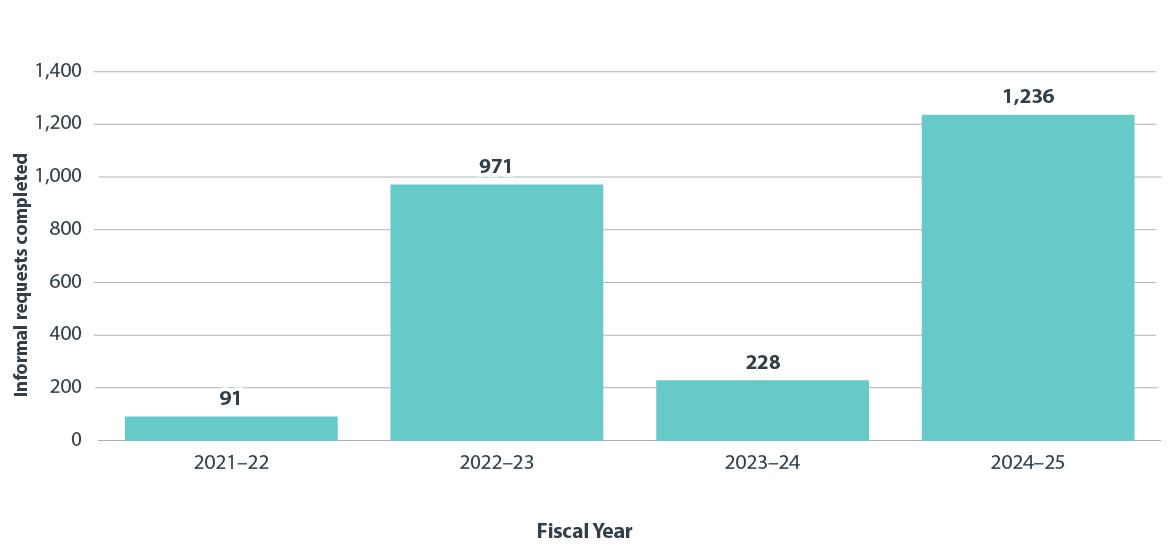
Figure 11 - Text version
| Year | 2021–22 | 2022–23 | 2023–24 | 2024-25 |
|---|---|---|---|---|
| Completed | 91 | 971 | 228 | 1,236 |
Informal pages released
TBS released 308,437 pages in response to informal requests in 2024–25. This represents an increase of 469% compared to the 54,148 pages released in 2023–24.
Figure 12 shows the number of pages released for informal requests completed from 2021–22 to 2024–25.
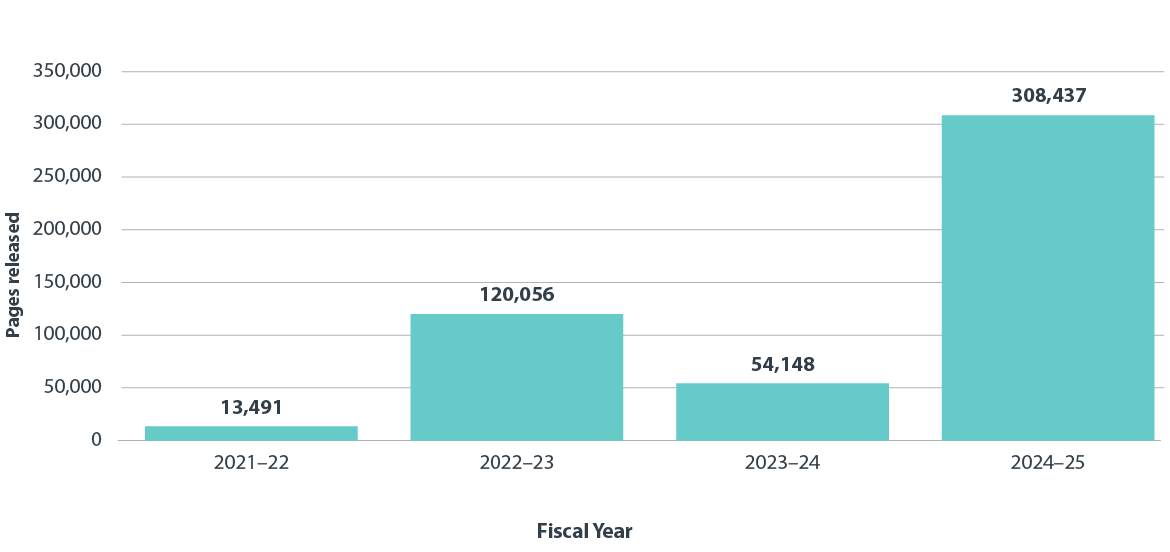
Figure 12 - Text version
| Year | 2021–22 | 2022–23 | 2023–24 | 2024-25 |
|---|---|---|---|---|
| Completed | 13,491 | 120,056 | 54,148 | 308,437 |
Part 5: consultations from other government institutions and organizations
Consultation requests received and carried forward
TBS received 161 consultation requests in 2024–25, which is consistent with the 160 consultation requests received in 2023–24.
Of the consultation requests received in 2023–24, 16 were carried forward to 2024–25.
Figure 13 shows, for 2020–21 to 2024–25, the number of consultation requests TBS received each year.
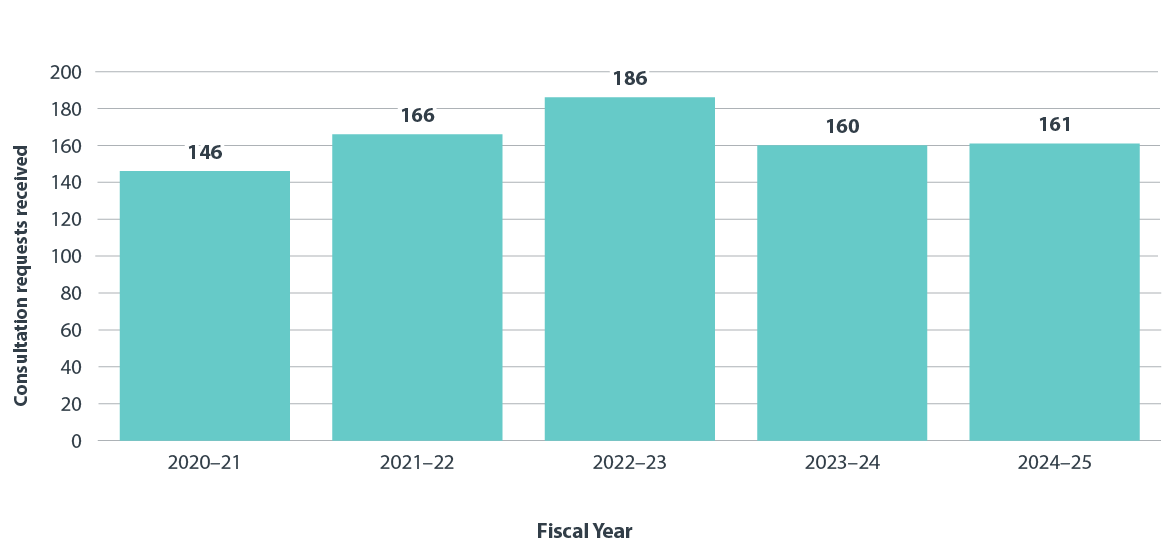
Figure 13 - Text version
| Year | 2020–21 | 2021–22 | 2022–23 | 2023–24 | 2024-25 |
|---|---|---|---|---|---|
| Completed | 146 | 166 | 186 | 160 | 161 |
Consultation requests completed and pages processed
TBS completed 160 consultation requests in 2024–25 and processed 5,766 pages for these requests. This number of pages represents a 12% decrease compared to the 6,574 pages processed in 2023–24.
Figure 14 shows the consultation requests completed and the pages processed from 2020–21 to 2024–25.
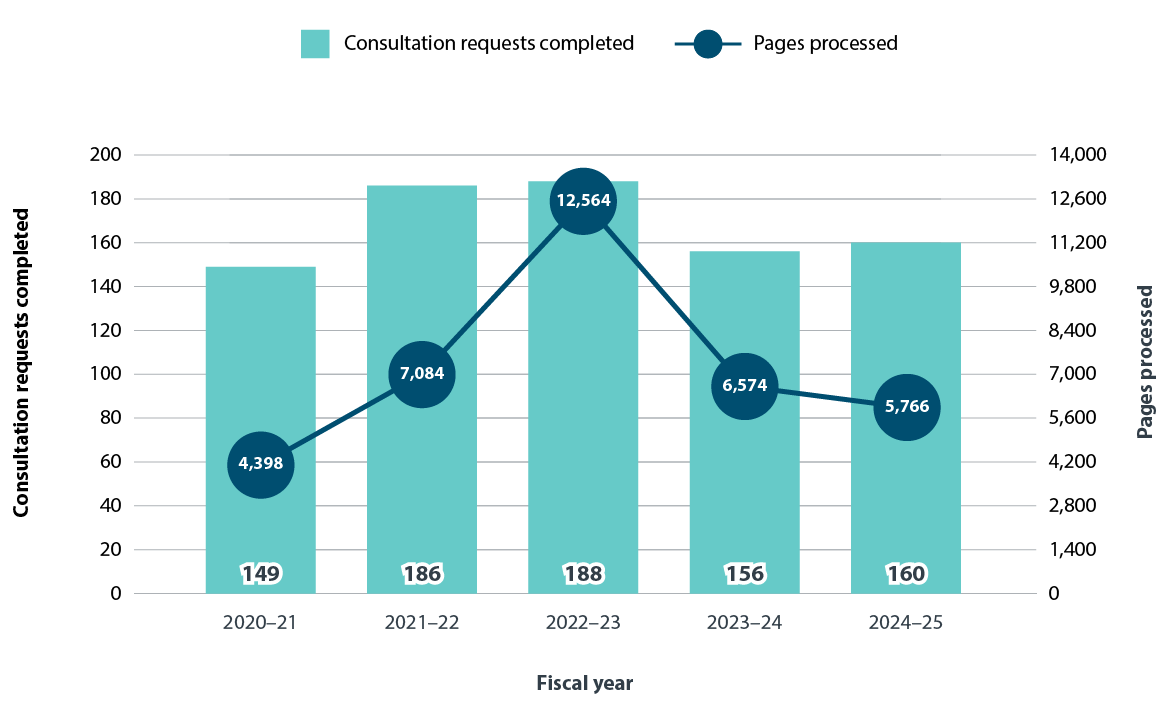
Figure 14 - Text version
| Year | 2020–21 | 2021–22 | 2022–23 | 2023–24 | 2024-25 |
|---|---|---|---|---|---|
| Consultation requests completed | 149 | 186 | 188 | 156 | 160 |
| Pages processed | 4,398 | 7,084 | 12,564 | 6,574 | 5,766 |
Completion time for consultations received from other Government of Canada institutions and other organizations
Of the 160 consultation requests completed this year, 69% were completed within 30 days and 96% were completed within 60 days.
Figure 15 shows the number of consultation requests completed by the time it took to complete the request.
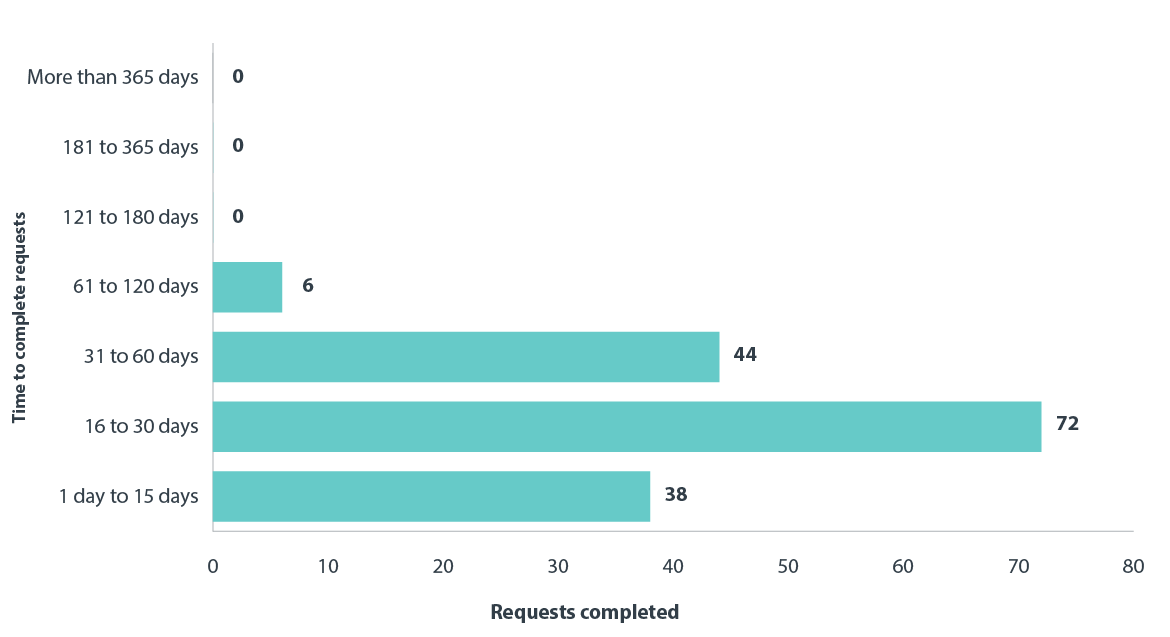
Figure 15 - Text version
| Completion time | 1 day to 15 days | 16 to 30 days | 31 to 60 days | 61 to 120 days | 121 to 180 days | 181 to 365 days | More than 365 days |
|---|---|---|---|---|---|---|---|
| Requests completed | 38 | 72 | 44 | 6 | 0 | 0 | 0 |
Part 6: consultations on cabinet confidences
Consultations with legal services
In 2024–25, TBS consulted with its legal services unit on 59 requests to evaluate information that could be subject to cabinet confidence. This number of consultations is a 3% decrease compared to the 61 cabinet confidence consultations conducted in 2023–24.
Of the 59 consultations with legal services in 2024–25, 86% (or 51) were completed within 30 days. All consultations with legal services conducted in 2024–25 were completed within 60 days.
Consultations with the Privy Council Office
No requests processed by TBS in 2024–25 required consultation with the Privy Council Office to evaluate cabinet confidences.
Part 7: complaints and investigations
Complaints received
Requesters can file a complaint with the Office of the Information Commissioner (OIC) if they are not satisfied with how their request was processed.
In 2024–25, TBS was notified of 31 complaints received by the OIC, a 158% increase compared to the 12 complaints received in 2023–24. The ATIP office approached this increase through the new Special Projects unit, which is in part dedicated to the resolution of complaints at TBS.
Table 1 shows the types of complaints about TBS received by the OIC in 2024–25.
| Complaint type | Number of complaints |
|---|---|
| Time limits | 3 |
| Delay: deemed refusal | 8 |
| Refusal: exemptions | 7 |
| Refusal: exclusion | 1 |
| Refusal: missing records | 9 |
| Miscellaneoustable 1 note * | 3 |
| Total | 31 |
Table 1 Notes
|
|
Complaint representations
The complaints process has many stages. Initially, the OIC contacts institutions to collect and review the processing file. During an investigation, the OIC must provide institutions with an opportunity to provide representations.
Complaints closed
The OIC issued findings for a total of 25 complaint investigations during 2024–25. Of the 25 complaint investigation findings issued, the OIC provided letters notifying TBS that it had ceased 15 of these investigations. Of the remaining 10 findings issued by the OIC, 5 were deemed not well founded and 5 were considered well founded.
On June 21, 2019, An Act to amend the Access to Information Act and the Privacy Act and to make consequential amendments to other Acts gave the OIC the power to make binding orders in relation to access to information requests, including ordering the release of government records for complaints filed after royal assent. TBS received and resolved 3 orders from the OIC in 2024–25, which was one more than the 2 orders received in 2023–24.
Table 2 shows the complaint findings issued by the OIC in 2024–25.
| Complaint type | Complaint decision | ||
|---|---|---|---|
| Not well founded | Well founded | Discontinued | |
| Time limits | 0 | 0 | 2 |
| Delay: deemed refusal | 0 | 3 | 5 |
| Refusal: exemptions | 2 | 2 | 3 |
| Refusal: exclusion | 0 | 0 | 0 |
| Refusal: missing records | 3 | 0 | 3 |
| Miscellaneous | 0 | 0 | 2 |
Key actions taken on complaints
To facilitate the timely resolution of complaints filed with the OIC, TBS established a dedicated unit responsible for:
- coordinating meetings twice a month with the OIC to manage and prioritize complaints at TBS
- conducting bi-weekly meetings with operational staff to ensure that complaint resolution is monitored and prioritized
- allocating operational staff dedicated to complaint resolution activities
TBS also streamlined approvals to increase efficiency of complaint responses.
Part 8: court actions
There were no court cases filed against TBS in relation to the ATIA in 2024–25.
Part 9: fees
In accordance with the changes to the ATIA that came into force on June 21, 2019, TBS may only charge an application fee of $5, as set out in paragraph 7(1)(a) of the Access to Information Regulations. Pursuant to the Directive on Access to Information Requests issued on July 13, 2022, institutions can waive this application fee as appropriate.
With respect to the $5 application fee to submit a request under the ATIA, the total revenue collected by TBS was $1,475 in 2024–25. Throughout the fiscal year, TBS waived $795 in application fees and refunded $75 in application fees.
Part 10: resources related to the Access to Information Act
Costs
- In 2024–25, TBS’s cost for administering the ATIA was $1,657,668. This includes:
- $1,376,093 in salary costs
- $234,494 in expenditures for annual maintenance and renewal of ATIP request processing software
- $31,000 in annual membership dues for the ATIP Community Development Office
- $3,567 for ePost Connect™ accounts
There were no costs associated with professional service contracts for 2024–25.
Human resources
In 2024–25, there were 15 full-time equivalents (FTEs) in the ATIP office performing work associated with the application of the ATIA.
Part 2 of the Access to Information Act
Under Part 2 of the of the ATIA, institutions are required to proactively publish specific information within certain timelines. Appendix B outlines the information that TBS is required to publish proactively.
Initiatives and projects to improve access to information
-
In this section
Departmental support for document reviews
The ATIP office often provides departmental support by conducting document reviews of records outside of the ATIA. These document reviews are conducted by the ATIP Operations Unit and the Intake, Governance, and Special Projects Unit to support the department in the following activities:
- litigation
- orders for the production of papers from Parliament
- audit reports
- publication of information
- briefing binders for new or incoming ministers and deputy ministers
- briefing note titles
- question period cards
In 2024–25, the ATIP office conducted:
- 7 reviews for active litigation
- 4 reviews for publications made by TBS to the Open Government Portal
- 5 reviews for the production of paper from Parliament
- 4 reviews for the proactive publication of briefing binders for incoming ministers and deputy ministers
- 247 reviews for proactive disclosure requests relating to briefing note title entries on the Open Government website
These document reviews resulted in 13,502 pages reviewed in 2024–25. The ATIP office is committed to helping departmental program areas provide access to information in ways that do not require an access to information request.
Education, training and awareness
ATIP training and awareness activities
The ATIP office conducted several training activities on processing requests in 2024–25.
The ATIP office continued to improve its outreach and training program in 2024–25 by developing its series of digital training modules. The first in the series, “Module 1: The Access to Information Act – An introduction for employees,” provides mandatory training to all TBS employees. This training module was added to the TBS intranet site in 2024–25 as recommended training for all TBS employees.
The ATIP office developed its second module, which provides step-by-step guidelines for sectors and subject matter experts on how to conduct searches and retrieve records for access to information requests. This module was made available to TBS employees in June 2025.
To increase engagement with the sectors and comply with policy requirements, the ATIP office provided sector liaison officer (SLO) training sessions with representatives in offices of primary interest. The session held in November 2024 included:
- a reintroduction to the SLO roles and responsibilities
- a reintroduction to the ATIP process at TBS
- an overview of ATIP and SLO statistics and performances
- a tutorial on how to complete the TBS ATIP sector return form
In 2024–25, the ATIP office also provided training to departmental officials on the proactive publication of briefing note titles addressed to ministers and deputy ministers outlined in Part 2 of the ATIA.
To commemorate International Right to Know Day, the ATIP office developed communication products and shared training resources for all TBS staff.
Table 3 outlines specific training initiatives conducted by the ATIP office in 2024–25.
| Initiative | Sector | Description | Responsible unit | Participants |
|---|---|---|---|---|
| TheATIA– An introduction for employees | All TBS | Digital presentation of mandatory training under the directive | Intake, Governance, and Special Projects Unit | 163 |
| International Right to Know Day | All TBS | Right to Know Day communications materials | Intake, Governance, and Special Projects Unit | All of TBS was invited to participate |
| Sector Liaison Training | All TBS SLOs | Training on the ATIA and sector responsibilities | Intake, Governance, and Special Projects Unit | 36 |
| Proactive Publication of Briefing Notes | Secretary’s Office, Strategic Communications and Ministerial Affairs, Office of the Comptroller General, Office of the Chief Information Officer, Office of the Chief Human Resources Officer | An overview of the process for proactively publishing briefing note titles | Intake, Governance, and Special Projects Unit | 9 |
ATIP tools to support departmental officials
The TBS ATIP office continued its efforts to ensure that departmental officials had access to tools to support them in their responsibilities under the ATIA. In 2024–25, the ATIP office:
- provided training on the ATIP sector response form
- developed a plain language guide for exemptions and exclusions of the ATIA and the PA
- updated the departmental intranet page to provide employees with quick access to all ATIA resources
Training for ATIP employees
TBS continued to support the professional development of ATIP employees through various mechanisms in 2024–25, including but not limited to:
- training offered by the TBS Access to Information and Privacy Community Development Office
- Information Access and Protection of Privacy certification courses from the University of Alberta
- Canadian Access and Privacy Association annual conference
- language training
Policies, guidelines and procedures
Extension of the ATIP delegation order to improve efficiency
In November 2023, the ATIP delegation order was expanded to provide additional authorities to managers and team leaders of the ATIP office. Extending the delegation order to reduce operational bottlenecks and to empower more individuals in the ATIP office is one component of the ATIP office’s modernization strategy aimed at increasing overall efficiency.
In 2024–25, TBS launched a phased implementation of the extended authorities under the delegation order to team leaders. The Intake, Governance, and Special Projects Unit used these extended authorities successfully in 2024–25 and demonstrated that removing multiple approval levels increased efficiency and operational outputs.
Limiting inter-institutional consultations
While the TBS ATIP office is continually working to limit inter-institutional consultations, TBS often collaborates and communicates with other departments. The ATIP office is selective about when it needs to consult other government departments.
Completed access to information request summaries
In accordance with the Directive on Access to Information Requests, the ATIP office publishes monthly summaries of completed access to information requests. A total of 249 summaries were published in 2024–25.
Monitoring compliance
The ATIP office produces a variety of regular and ad hoc reports to monitor TBS’s compliance with the ATIA. In 2024–25, the ATIP office continued its emphasis on data analytics to identify emerging trends and promote procedural efficiencies.
The ATIP office creates and distributes several reports outlining the performance of the ATIP office and the challenges it faces. These reports include:
- quarterly reports on sector performance and quality of record retrieval
- ATIP Performance Dashboards to senior management on the monthly performance of the ATIP office
- weekly reports on requests received and requests that will be closed
- reports to the executive committee with statistics on the ATIP office, including requests received and closed, complaints and the on-time compliance rates
- service inventory
- annual statistical reports to TBS
Conclusion
The ATIA and the PA are important pillars in maintaining the accountability and transparency of federal institutions, promoting an open and democratic society, and protecting the privacy of individuals. While TBS had a productive 2024–25, there are outstanding challenges and additional opportunities to achieve excellence for Canadians.
Transparency and accountability are an ongoing commitment. TBS looks forward to building on the successes of 2024–25 and continuing to uphold these principles for Canadians in 2025–26.
Appendix A. Delegation Order – Access to Information Act
I, undersigned, President of the Treasury Board, pursuant to section 95 of the Access to Information Act, hereby designate the ATIP officers; the Access to Information and Privacy Team Leader; the Access to Information and Privacy Manager; the Access to Information and Privacy Director; the Senior Director, Ministerial Services; the Assistant Secretary, Strategic Communications and Ministerial Affairs; and the Secretary, or person occupying those positions on an acting basis, to exercise signing authorities or perform any of the President’s powers, duties or functions as head of institution that are specified in the attached Schedule A. This designation replaces all previous delegation orders.
Original signed by
The Honourable Anita Anand
President of the Treasury Board
Date: 2023-11-29
Schedule A: sections of the ATIA to be delegated
| Position | Powers, duties, or functions |
|---|---|
| Secretary | Full authority |
| Assistant Secretary, Strategic Communications and Ministerial Affairs | Full authority |
| Senior Director, Ministerial Services | Full authority, except: Subsection: 37(1) |
| Director, Access to Information and Privacy | Full authority, except: Subsection: 37(1) |
| Manager, Access to Information and Privacy | Full authority, except: Paragraph: 35(2)(b) Subsection: 37(1) |
| Team Leader, Access to Information and Privacy | Full authority, except: Paragraph: 35(2)(b) Subsection: 37(1) |
| Access to Information and Privacy Officers | Paragraph: 7(a) |
Appendix B. Proactive publication requirements
| Legislative requirement | Section of ATIA | Publication timeline | Does the requirement apply to your institution? (Yes/No) | Internal group(s) or positions(s) responsible for fulfilling requirement | % of proactive publication requirements published within legislated timelines | Link to web page where published |
|---|---|---|---|---|---|---|
| Apply to all government institutions as defined in section 3 of the Access to Information Act | ||||||
| Travel expenses | 82 | Within 30 days after the end of the month of reimbursement | Yes | Corporate Services Sector | 100% | The Open Government Portal – Travel |
| Hospitality expenses | 83 | Within 30 days after the end of the month of reimbursement | Yes | Corporate Services Sector | 100% | The Open Government Portal – Hospitality |
| Reports tabled in Parliament | 84 | Within 30 days after tabling | Yes | Strategic Communications and Ministerial Affairs | 100% | The Open Government Portal – Reports |
| Apply to government entities or departments, agencies, and other bodies subject to the ATIA and listed in Schedules I, I.1, or II of the Financial Administration Act | ||||||
| Contracts over $10,000 | 86 | Q1–3: Within 30 days after the quarter Q4: Within 60 days after the quarter |
Yes | Corporate Services Sector | 100% | The Open Government Portal – Contracts |
| Grants & contributions over $25,000 | 87 | Within 30 days after the quarter | Yes | Corporate Services Sector | 100% | The Open Government Portal – Grants and Contributions |
| Packages of briefing materials prepared for new or incoming deputy heads or equivalent | 88(a) | Within 120 days after appointment | Yes | Strategic Communications and Ministerial Affairs | 100% | The Open Government Portal – DM Briefing Materials |
| Titles and reference numbers of memoranda prepared for a deputy head or equivalent, that is received by their office | 88(b) | Within 30 days after the end of the month received | Yes | Strategic Communications and Ministerial Affairs | 100% | The Open Government Portal – BN Titles |
| Packages of briefing materials prepared for a deputy head or equivalent’s appearance before a committee of Parliament | 88(c) | Within 120 days after appearance | Yes | Strategic Communications and Ministerial Affairs | 100% | The Open Government Portal – DM Parliamentary Appearances |
| Applies to government institutions that are departments named in Schedule I to the Financial Administration Act or portions of the core public administration named in Schedule IV to that act (government institutions for which Treasury Board is the employer) | ||||||
| Reclassification of positions | 85 | Within 30 days after the quarter | Yes | Human Resources Division | 100% | The Open Government Portal – Reclassification |
| Apply to ministers’ offices (therefore apply to any institution that performs proactive publication on behalf of a minister’s office) | ||||||
| Packages of briefing materials prepared by a government institution for new or incoming ministers | 74(a) | Within 120 days after appointment | Yes | Strategic Communications and Ministerial Affairs | 100% | The Open Government Portal – Minister Briefing Material |
| Titles and reference numbers of memoranda prepared by a government institution for the minister, that is received by their office | 74(b) | Within 30 days after the end of the month received | Yes | Strategic Communications and Ministerial Affairs | 100% | The Open Government Portal – BN titles |
| Package of question period notes prepared by a government institution for the minister and in use on the last sitting day of the House of Commons in June and December | 74(c) | Within 30 days after last sitting day of the House of Common in June and December | Yes | Strategic Communications and Ministerial Affairs | 100% | The Open Government Portal – Question Period |
| Packages of briefing materials prepared by a government institution for a minister’s appearance before a committee of Parliament | 74(d) | Within 120 days after appearance | Yes | Strategic Communications and Ministerial Affairs | 100% | The Open Government Portal – Minister’s Parliamentary Appearances |
| Travel expenses | 75 | Within 30 days after the end of the month of reimbursement | Yes | Corporate Services Sector | 100% | The Open Government Portal – Travel |
| Hospitality expenses | 76 | Within 30 days after the end of the month of reimbursement | Yes | Corporate Services Sector | 100% | The Open Government Portal – Hospitality |
| Contracts over $10,000 | 77 | Q1–3: Within 30 days after the quarter Q4: Within 60 days after the quarter |
Yes | Corporate Services Sector | 100% | The Open Government Portal – Contract |
Ministers’ offices expenses Note: This consolidated report is currently published by TBS on behalf of all institutions. |
78 | Within 120 days after the fiscal year | Yes | Corporate Services Sector | 100% | The Open Government Portal – MO Expenses |
© His Majesty the King in Right of Canada, as represented by the President of the Treasury Board, 2025
ISSN: 2371-2910